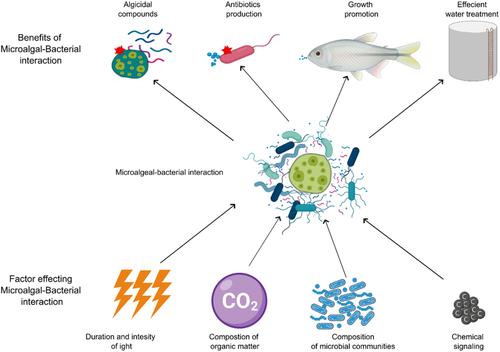当前位置:
X-MOL 学术
›
Rev. Aquacult.
›
论文详情
Our official English website, www.x-mol.net, welcomes your
feedback! (Note: you will need to create a separate account there.)
Implications of Microalgal–Bacterial Interactions in Modern Aquaculture Practices: A Review of the Current Knowledge
Reviews in Aquaculture ( IF 8.8 ) Pub Date : 2024-10-10 , DOI: 10.1111/raq.12980 Sardar Ali, Waqas Waqas, Md. Akibul Hasan Bakky, Sahib Zada, Uddin Md Saif, Md Tawheed Hasan, Muhammad Shafiq, Tariq Dildar, Wang Hui
Reviews in Aquaculture ( IF 8.8 ) Pub Date : 2024-10-10 , DOI: 10.1111/raq.12980 Sardar Ali, Waqas Waqas, Md. Akibul Hasan Bakky, Sahib Zada, Uddin Md Saif, Md Tawheed Hasan, Muhammad Shafiq, Tariq Dildar, Wang Hui

|
Microalgae play a crucial role in aquaculture due to their nutritional value and antimicrobial properties, yet harvesting them can be energy intensive. To address this, microalgal–bacterial interactions have emerged as a sustainable approach, enhancing growth rates and wastewater treatment efficiency but also significantly improve nutrient cycling, particularly through the removal of ammonia and phosphorus. These interactions range from mutualism to antagonism, influencing nutrient exchange and ecological niche formation. Despite their potential, the integration of bacterial–microalgal consortia remains limited in aquaculture. This review aims to expand understanding of these interactions, their benefits, and their role in optimizing aquaculture systems. Various aspects of microalgae–bacterial interactions, including mutualistic and commensal relationships, antibiotics production by algae, and the algicidal role of bacteria, are discussed. Factors influencing these interactions, such as nutrient availability, the physical environment, chemical signaling, and microbial community composition, are also explored. The potential effects of microalgae–bacterial interactions on aquaculture, including enhanced revenue, efficiency, and ecological sustainability, are highlighted. Further research is needed to identify bacterial groups' influence on microalgal output and their potential for enhancing productivity in commercial aquaculture systems. Understanding and leveraging these microbial interactions could significantly improve aquaculture practices.
中文翻译:

微藻-细菌相互作用对现代水产养殖实践的影响:当前知识回顾
由于其营养价值和抗菌特性,微藻在水产养殖中起着至关重要的作用,但收获它们可能是能源密集型的。为了解决这个问题,微藻-细菌相互作用已成为一种可持续的方法,可以提高生长速率和废水处理效率,但也显着改善营养循环,特别是通过去除氨和磷。这些相互作用的范围从共生到对抗,影响营养交换和生态位形成。尽管它们具有潜力,但细菌-微藻联盟在水产养殖中的整合仍然有限。本综述旨在扩大对这些相互作用、它们的好处以及它们在优化水产养殖系统中的作用的理解。讨论了微藻-细菌相互作用的各个方面,包括互惠关系和共生关系、藻类产生的抗生素以及细菌的灭藻作用。还探讨了影响这些相互作用的因素,例如营养物质可用性、物理环境、化学信号传导和微生物群落组成。强调了微藻-细菌相互作用对水产养殖的潜在影响,包括提高收入、效率和生态可持续性。需要进一步的研究来确定细菌群对微藻产量的影响及其提高商业水产养殖系统生产力的潜力。了解和利用这些微生物相互作用可以显着改善水产养殖实践。
更新日期:2024-10-10
中文翻译:

微藻-细菌相互作用对现代水产养殖实践的影响:当前知识回顾
由于其营养价值和抗菌特性,微藻在水产养殖中起着至关重要的作用,但收获它们可能是能源密集型的。为了解决这个问题,微藻-细菌相互作用已成为一种可持续的方法,可以提高生长速率和废水处理效率,但也显着改善营养循环,特别是通过去除氨和磷。这些相互作用的范围从共生到对抗,影响营养交换和生态位形成。尽管它们具有潜力,但细菌-微藻联盟在水产养殖中的整合仍然有限。本综述旨在扩大对这些相互作用、它们的好处以及它们在优化水产养殖系统中的作用的理解。讨论了微藻-细菌相互作用的各个方面,包括互惠关系和共生关系、藻类产生的抗生素以及细菌的灭藻作用。还探讨了影响这些相互作用的因素,例如营养物质可用性、物理环境、化学信号传导和微生物群落组成。强调了微藻-细菌相互作用对水产养殖的潜在影响,包括提高收入、效率和生态可持续性。需要进一步的研究来确定细菌群对微藻产量的影响及其提高商业水产养殖系统生产力的潜力。了解和利用这些微生物相互作用可以显着改善水产养殖实践。




















































 京公网安备 11010802027423号
京公网安备 11010802027423号